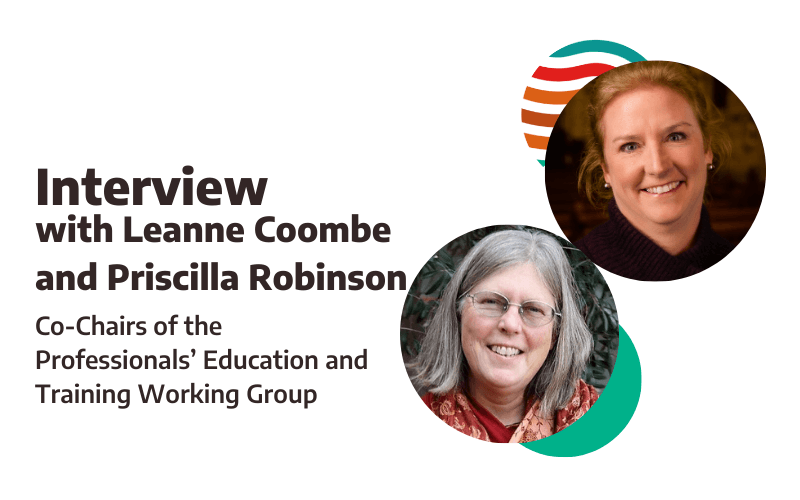
Professionals’ Education and Training Working Group Chair Interview: Leanne Coombe and Priscilla Robinson
News
Sep 24, 2024
We are delighted to introduce Priscilla Robinson and Leanne Coombe, the co-chairs of the World Federation of Public Health Associations (WFPHA) Working Group on Professionals’ Education and Training. This group is dedicated to enhancing the standards of public health education globally.
Let’s dive into their insights on the group’s formation, achievements, and future goals.
Please introduce yourselves
Priscilla Robinson: My name is Priscilla Robinson. I’ve been associated with the WFPHA for about ten years and a member of the Public Health Association of Australia for nearly 35 years. I am an Adjunct Associate Professor at La Trobe University in Australia, co-chairing this working group. My career began in nursing, with training in various nursing specialties, and then moved into epidemiology and infectious disease in public health and public health education.
Leanne Coombe: I’m Leanne Coombe, employed as the Policy and Advocacy Manager at the Public Health Association of Australia, and I also co-chair the Professional Education and Training Working Group. I’ve been involved with the WFPHA and this working group since 2018. I’m also an Honorary Associate Professor at The University of Queensland. My background is in oral health, but I have focused extensively on public health, particularly Indigenous health. My career has always been oriented toward preventive health, naturally leading me to public health.
How did this working group come about?
Priscilla Robinson: About 14 years ago, during one of its strategic reviews, the Federation identified the need for a professional education and training working group. I was the second Chair of the group and later invited Leanne to co-chair, given her expertise and enthusiasm. Since then, we have focused on addressing the educational needs identified by the Federation and have made significant contributions to its overall mission.
Can you describe the current involvement and membership of the working group?
Leanne Coombe: When I joined as co-chair in 2018, the group was relatively small and inactive. Since then, we’ve garnered interest from academics worldwide and have consciously expanded our membership by recruiting early-career public health professionals, experienced practitioners, and academics. We’ve also established a successful internship program, engaging young professionals who often stay on after their internships.
Priscilla Robinson: It’s important to note that our group is also diverse globally and ethnically. We maintain an informal structure where members feel comfortable contributing regardless of their education level, significantly enhancing our work. This approach allows us to leverage the expertise and energy of our members very appropriately and effectively.
How has the working group contributed to the development of public health education?
Priscilla Robinson: Our primary focus is public health education for professional practice. We have published several peer-reviewed papers, such as analyzing public health competencies commonly used in the field. Additionally, we have been involved with the WHO’s Public Health and Emergencies Workforce Roadmap Project, contributing to its competency framework. This work will guide the development of public health education worldwide for years to come.
What initiatives is the group currently working on?
Leanne Coombe: We’re currently working on two major projects. First, we are contributing to the implementation phase of the WHO Roadmap, focusing on standardizing public health education globally. We’re engaging accrediting and regulatory agencies to adopt the competency framework. Second, we’re benchmarking public health education worldwide, analyzing course content, delivery methods, faculty training, and support. This research will inform our efforts to standardize education across different regions.
What are your plans for the future
Priscilla Robinson: Post-pandemic, we need to ensure that the advancements in public health education and workforce training remain and evolve. Only about one-fifth of the global public health workforce is formally trained in public health, which can lead to significant shortfalls in expertise. Our goal is to improve accreditation and regulation, ensuring that all professionals involved in public health understand its principles and their role in it.
Leanne Coombe: We’re also looking to support other WFPHA working groups in implementing the WHO Roadmap within their disciplines, such as Indigenous, One Health, and Environmental health. We will continue contributing and adapting to emerging needs as the roadmap project progresses. We welcome anyone interested in joining us and helping with our mission.
Priscilla Robinson and Leanne Coombe have shown immense dedication and vision in leading the WFPHA Working Group on Professionals’ Education and Training. Their efforts are shaping the future of public health education and ensuring that the global workforce is better prepared for the challenges ahead. Their inclusive and collaborative approach invites all interested professionals to join and contribute to this vital work.
Working group members:
Christina Severinsen, School of Health Sciences, Massey University, Palmerston North, New Zealand
Dorothy Biberman, Manager Global Health Programs ASPPH, USA
Elisabeth Mukendi, medical doctor from the Democratic Republic of Congo
Elsheikh Badr, President of the Sudanese Public Health Association, Sudan
Geri Kemper Seeley, Program Manager, Applied Public Health, Office of Applied Public Health, Milken Institute School of Public Health, The George Washington University, USA.
Haitham Bashier, Director at The Eastern Mediterranean Public Health Network (EMPHNET), Amman, Jordan
Harsha Somaroo, Public Health Association of South Africa, South Africa
Kasia Czabanowska, Professor in Public Health Leadership and Workforce Development and International Health School CAPHRI, Care & Publ Health Res In Fac. Health, Medicine and Life Sciences, the Netherlands
Laura King EdD, MPH, MCHES serves as the Executive Director of the Council on Education for Public Health, USA
Laura Magaña, PhD, MS, President and Chief Executive Officer, Association of Schools and Programs of Public Health, USA
Leanne Coombe, Faculty of Medicine, University of Queensland, Herston, Queensland
Linda Murray, Senior Lecturer at Massey University, New Zealand
Priscilla Robinson, School of Psychology and Public Health, La Trobe University, Melbourne
Saskia Jaenecke, Fulda University of Applied Sciences, Fulda, Germany
